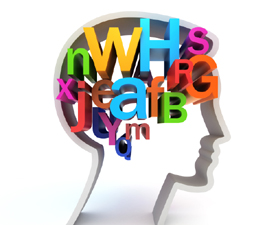Based on the Oxford Learner’s Advanced Dictionary, learning is defined as acquiring and getting of subject or a skill by study, experience, or instruction. Specifically, Kimble and Garmezy (1963) define learning as a relatively permanent change in behavioral tendency and the result of reinforced practice. While teaching is showing or helping someone to learn how to do something, giving instructions, guiding in the study of something, providing with the knowledge, causing to know or understand. Those activities are sophisticated to understand because they have not explicitly reviewed by the specific activities of the brain. The brain through hearing, sight, wording, and touching are conceptual. Therefore, there must be a clear description of it as the following chart:
Brain (as information receiver)
| Information => Receiving, Collecting, Sorting, Retaining, Reflecting, and Discriminating => Recalling Process |
Figure 1. The relation process of information, brain, and recalling stages
The first step of learning process is getting of acquiring information, knowledge, or skill. Students acquire the knowledge from lecture or oral explanation (listening); (speaking); analyzing chart, map and other visual objects (reading); and rewriting or resuming (writing). At the first stage, they may only listen to explanations given. This means that hearing plays very important role to acquire that knowledge and there is only little role of the other senses as mouth, sight, and hand. At the second stage, the role of mouth is more stick out when the learning materials are acquired through repetition or memorization. Only little role of hearing followed by sight, mouth and hand is applied. The next is rereading that plays sight, mouth, and for some extent hearing more important particularly for reading aloud. The last one is resuming materials from lectures or texts that involve sight, hands, and little role of mouth and hearing if the materials are recited loudly.
When a learner acquires knowledge, he or she is promoting brain as knowledge receiver to receive the knowledge. In this stage, the brain receives information from any manners. To get it, however, students should concentrate because they will lose some information especially gotten from lectures. Thus, to get full understanding, brain should be set to concentrate. This is the students’ responsibility to work the brain.
Learners engage with unlimited information in learning processes. In one time allotment (2 x 50 minutes for university students), for instance, they should transform the unlimited information. Besides receiving, students also collect the information in their brain. There is some information taken in one learning activity in one field of study or subject. The potency of the brain to collect the knowledge is astonishing. Therefore, the collection of the information becomes more huge and huge in a day lecture, in a week, in a semester in terms of several subjects. If they take 10 subjects in one semester, they should provide 10 collecting-brain boxes to collect the concerning knowledge.
In the receiving and collecting processes, information or knowledge may spread haphazardly in any places of the brain boxes. Therefore, it must be sorted and put at the correct places. Unless, the linguistic materials may enter onto learning theories’ boxes. Conversely, those learning theories come into methods of language teaching materials’ boxes and the like. Therefore, brain needs to sort the information and replace it into the correct and rights boxes. Simple-present knowledge should be in simple present box, the simple-past knowledge should be in the simple-past box, etc. Without sorting information, the brain will miss-recall or mix the different information at the same place.
A writer has an unforgettable experience. In a final exam, the writer asked several questions in a field of study. Unfortunately, several students could not match the questions and their answers and pair them with the wrong numbers. The examples are as follows:
The wrong matching:
Teacher: Mention several functions of language!
Students: The function of language is for listening, speaking, reading and writing.
The correct one:
Teacher: Mention several functions of language!
Students: The function of language is for personal, interpersonal, regulatory, and imaginative expressions.
Based on the above examples, it is clear that students mismatch the language skills and its functions. Therefore, sorting is very crucial stage in learning.
Written by: Ruwandi, MA
(F)
 |

